【Nov. 19 is World Toilet Day】Reconsidering and revolutionizing toilets in developing countries
2020.11.19
Can you imagine life without a toilet?
Around the world, about 2 billion people still have no access to basic sanitation services (toilets). This represents about 26% of the world's total population. Approximately 670 million of these people are practicing open defecation, and their excrement serves as a source of transmission of pathogens through flies, which can lead to the spread of infectious diseases.
In order to prevent the spread of COVID-19, the importance of hand washing is once again drawing attention. Along with hand washing and the securing of safe water, the provision of toilets is essential not only for the prevention of infectious diseases but also for the improvement of health.
Nov. 19 is World Toilet Day. It was established by the United Nations in 2013 to promote awareness of toilet-related issues around the world. JICA is implementing a variety of initiatives to promote the use of toilets in developing countries. These include the building of water and sewage systems, the introduction of environmentally friendly toilets suitable for each region, and the raising of hygiene and environmental awareness among residents.
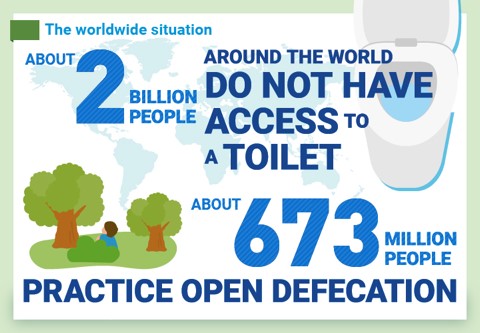
Source: WHO/UNICEF JMP (2019) Progress on household drinking water, sanitation and hygiene 2000-2017. Special focus on inequalities
Basic sanitation services (toilets) are defined as improved sanitation facilities (toilets) that are not shared with other households. This includes flush toilets in Japan and pit latrines with slab, which are common in developing countries, where excrement is stored in a pit (hole) and then mineralized and removed after it has become harmless.
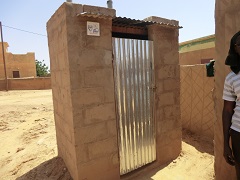
A pit latrine with slab in Senegal installed by JICA
Photo by JAPAN TECHNO CO., LTD.
Why, then, is this basic sanitation service (toilet) lagging behind in developing countries?
There are various reasons for this, depending on the country or region, including the fact that it is common to practice open defecation, and it is not possible to secure the funds necessary to build toilets. There is also a lack of awareness of the need for toilets, and religious beliefs that excreting is considered unclean. Therefore, there are many issues that cannot be solved simply by providing funds and increasing the number of toilets.
Delays in the popularization of toilets lead to unsanitary living conditions, which in turn contribute to diseases such as diarrhea. Diarrhea is a deadly disease in developing countries, with approximately 525,000 infants and children under the age of five dying annually worldwide. Moreover, around the world, 367 million people attend schools without toilets. Where the schools do have toilets, they are shared between boys and girls, making it particularly difficult for girls to go to school during their menstruation. In other words, the widespread use of toilets will not only improve health and hygiene, but also lead to education and gender equality.
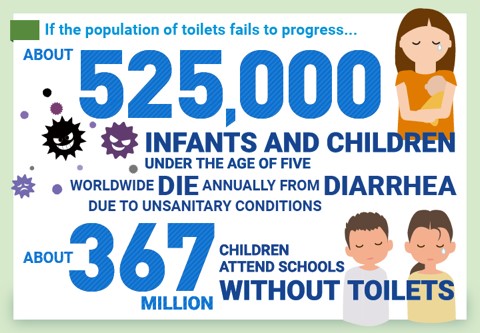
Source: WHO/UNICEF JMP (2019) Progress on household drinking water, sanitation and hygiene 2000-2017. Special focus on inequalities
Let us look at JICA's efforts to promote the use of toilets in India as an example.
According to the report prepared by WHO/UNICEF (2019), in India, the percentage of the population with access to basic sanitation services has improved significantly from 16% in 2000 to about 60% in 2017. This has been attributed to the Indian government's push for increased construction of toilets, especially in rural areas, since 2014.
Nevertheless, while about a quarter of the population still lacks access to basic sanitation services (toilets), JICA has contributed to the installation of more than 1,500 public toilets in India. In addition, in order to promote awareness of the necessity and importance of sewage treatment and to establish the custom of using toilets in society, JICA has been working on various initiatives, such as public health campaigns through NGOs and hygiene education in schools.
Additionally, a private Japanese company has introduced to India environmentally friendly toilets that do not spill the sewerage, to enable installation of toilets in areas where sewage systems have not yet been developed. Japanese technology is being adopted to help popularize the use of toilets in India.
Regarding the current situation and issues involved in the toilets, AKAMINE Kengo, senior representative of JICA India Office, says, “Building toilets is not enough; there exists various needs of people, especially of women, which should be addressed for sustainable sanitation, such as safety, water connection, and maintenance. Further, awareness among the public concerning toilets is critical and plays an instrumental role in achieving the goal, so therefore, we try to include awareness-raising activities for residents and students.”
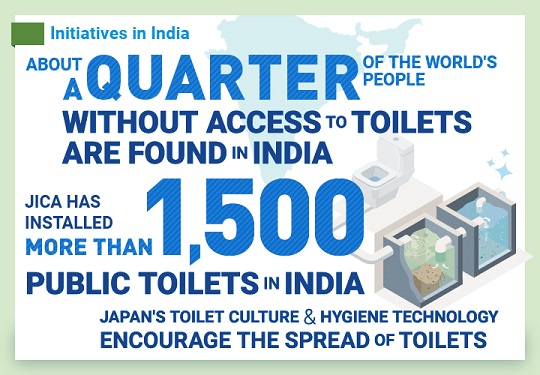
Source: WHO/UNICEF JMP (2019) Progress on household drinking water, sanitation and hygiene 2000-2017. Special focus on inequalities
Despite the progress being made in promoting the use of toilets worldwide, approximately 70% of people (as of 2017) in Sub-Saharan Africa still lack access to basic sanitation services (toilets). In this context, JICA is supporting the popularization of toilets in Mozambique and Senegal, among other countries.
In the construction of toilets in schools in Mozambique, we considered the location of the toilets to make it easier for disabled people and girls to access them, and also built hand washing facilities. To ensure safe and stable access to water, where there was no well at the school, new wells were constructed at the same time as the toilets.
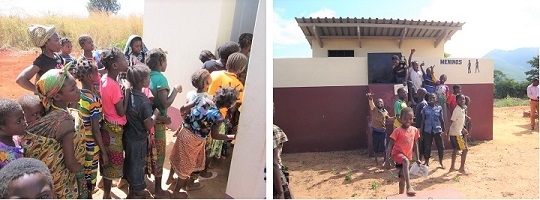
Girls learning how to use a toilet at a school in Mozambique (left) and boys enjoying the completion of a new toilet (right)
Photo by JAPAN TECHNO CO., LTD.
However, Japan Overseas Cooperation Volunteers who were dispatched to the region have pointed out the difficulties in the maintenance and upkeep of toilets, such as the lack of thorough cleaning and that faucets in hand washing facilities are being stolen.
In this way, the popularization of toilets is not limited to the construction of toilets. It is important to establish a system of maintenance and upkeep so that toilets are ingrained in people's lives and that they are used properly.
If the use of toilets becomes habitual, diarrheal diseases caused by practicing open defecation will decrease and malnutrition will be reduced. Therefore, we continue to work with local people to raise awareness of the importance of promoting the use of toilets and their relationship to nutrition.
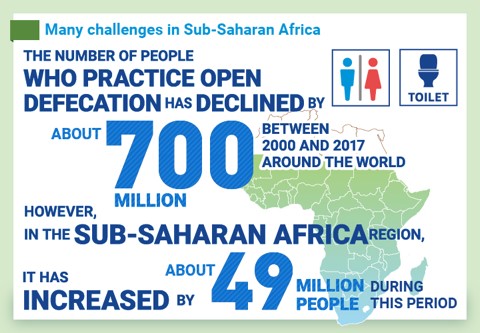
Source: WHO/UNICEF JMP (2019) Progress on household drinking water, sanitation and hygiene 2000-2017. Special focus on inequalities
scroll